An update on the Corteva Farm at the Food Bank of Delaware
September 24, 2018
One year ago, the Corteva Farm at our future home at 222 Lake Drive was a four-acre parcel filled with debris, trash and overgrown plants and trees. Today it’s in the beginning stages of a production farm designed to help train Delawareans for careers in the agricultural sector and create a way for the Food Bank of Delaware to grow produce not only to support hunger-relief programming, but also to support social enterprise initiatives.
Over the fall months of 2017, the parcel underwent grading and leveling work, and construction of two high tunnels and a propagation house for year-round growing was completed in May 2018.
The property as undergone a complete transformation.
Several varieties of peppers and tomatoes are growing in the high tunnels, and social enterprise initiatives on the farm have already started. Farm Manager Patrick Eggleston has established business with four area restaurants, La Fia, Hearth, Home Grown and Two Stones Pub. We are proud that produce grown on the farm is featured in dishes at these popular restaurants. Recently, the chefs at La Fia prepared a basil garlic focaccia with tomato olive butter prepared with basil and tomatoes from the farm.
Patrick harvests peppers and tomatoes several times a week with the help of volunteers and delivers the restaurant orders throughout the week.
In addition to the work inside the high tunnels, he has been working outside to enrich the once debris-filled soil with nutrients and organic matter through a variety of cover crop rotations. In the coming weeks, Patrick will mow the current cover crop and seed clover and winter rye.
A compost donation from Perdue will be delivered later this month to help provide a boost of much needed nutrients.
As the summer growing season comes to a close, Patrick and students from the first Farm and Agriculture Skills Training (F.A.S.T.) class, scheduled to begin October 30, will prepare the tunnels for the winter growing season. A variety of cold winter crops, lettuce, arugula, kale, root vegetables such as beets and radishes, mustard greens and Swiss chard, will grow in the high tunnels.
These items will be available for sale through a winter CSA box. The boxes will be supplemented with items grown from other local farms. (More information about the winter CSA box to come!)
The heated propagation house will also be used over the winter months to start seedlings and grow microgreens.
And while the summer 2018 growing season is not quite finished yet, Patrick is already looking ahead to spring/summer 2019. He plans to grow tomatoes, peppers, eggplants, cucumbers, carrots and root vegetables next season.
Interested in learning more about the F.A.S.T program? Click here to learn more!










